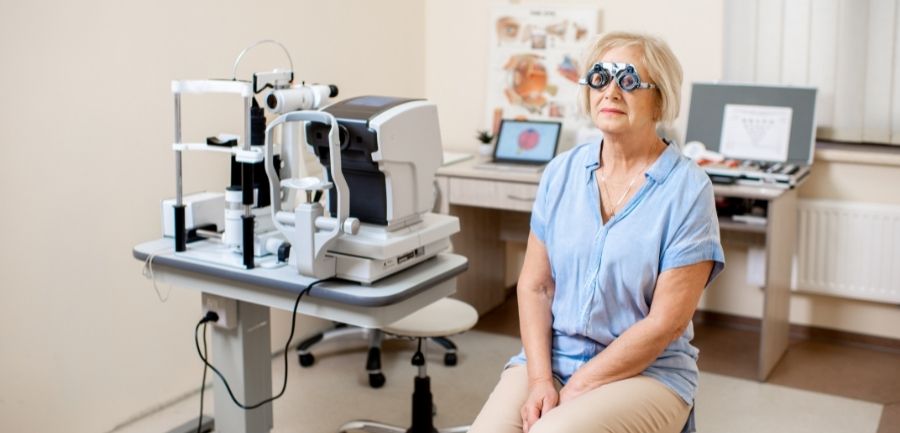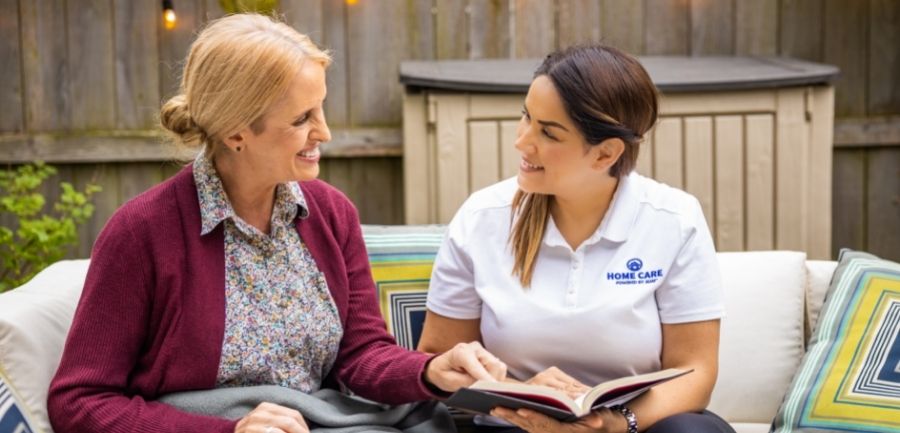
How To Care for Elderly Persons With Low Vision
January 12, 2022“The eyes are the windows to the soul” is an expression that explains the importance of eyesight to connect with the world. Eye vision is important because it allows us to connect with our people, keeps us safe, and helps us maintain a healthy mind. As we age, our eyesight takes a hit due to multiple reasons. This article discusses how to care for elderly persons with low vision.
With the youngest of the baby boomers hitting 65 by 2029, the number of people with visual impairment or blindness in the United States is going to double to more than 8 million by 2050. This is based on projections based on the most recent census data and from studies funded by the National Eye Institute, part of the National Institutes of Health. Hence it is important for elderly caregivers to take care of and help older adults cope with low vision.
Common Vision Problems in Seniors
There are several common eye problems and issues; that your eye doctor will look for during Vision Exams for the Elderly. Those include:
- Presbyopia occurs when seniors have more difficulty seeing things up close and is considered a normal part of aging.
- Age-Related Macular Degeneration (AMD) causes vision loss, but not usually total blindness. There is no cure for AMD, for the nerve cells in the retina are responsible for detailed vision, such as reading or facial recognition.
- Cataracts are a clouding or darkening of the eye’s lens that affects vision. Cataract surgery is one of the most common surgeries performed and has success. Risk factors for cataracts include diabetes, high blood pressure, and smoking.
- Diabetic Retinopathy is an eye condition caused by damage to the blood vessels in the eyes.
- Glaucoma occurs when there is increased pressure in the eye. Your eye doctor will examine the optic nerve and measure the pressure in your eye to diagnose glaucoma. The risk for glaucoma increases as we age.
In addition to ensuring that corrective prescriptions are current, checking for these vital eye health issues highlights the importance of regular eye exams for seniors.
Important tips to take care of Seniors with low vision
1. Regular Eye exams
The American Academy of Ophthalmology (The Academy) recommends having a complete eye exam with an ophthalmologist every year or two for adults aged above age 65. For this purpose keeping up with regular eye exams allows ophthalmologists to catch problems early. The sooner a problem is detected, the more likely it is that treatment will be successful.
During regular eye exams, your ophthalmologist will check for age-related eye diseases, including:
- Age-related macular degeneration
- Diabetic Retinopathy
- Glaucoma
- Cataract
2. Identifying symptoms of failing vision
It is important to realize that vision loss is a continuing process, so older adults and their caregivers may not be aware of the eye vision issues. Caregivers should watch out for these symptoms or warnings in older persons.
- Notice if they are moving closer to TV screens or mobile screens.
- Constant tripping and bumping into objects.
- They are walking or taking the support of nearby walls or furniture.
- Usually, they squint or frown while reading and focussing on writing.
- They are suffering from issues with Dry, red, itchy, or watery eyes as a result of low vision.
3. Rules of the Road Review Course
As our elderly loved ones age, their vision becomes an issue, and driving becomes a challenge. Therefore as a caregiver, it is good to ensure that they are wearing the right eyeglasses prescribed for them, not to drive under the influence of medication. Check the DMV guidelines for license renewal for senior citizens.
Illinois has senior programs that are special classes for older adults above 65 to drive safely. Here is the link to avail of this wonderful program.
Make your Senior’s home bright and safe.
It is important to realize making the Senior’s house safe to walk and access all rooms freely is crucial. Ensure that no rugs and carpets might create a trip hazard for the Senior. Make their walking pathways clear and clutter-free. Lighting is undoubtedly the most important crucial safety feature for an elderly house.
Offering care and mental support
It is important to realize that elderly loved ones need extra attention, care, and love with low vision. It can create fears and unrest with worsening visual impairments. Hence it is important to encourage and assist your loved ones to retain their daily lifestyles. Offer to accompany or assist them with their day-to-day activities and become their support system.
Companionship becomes crucial for well being of your loved one with visual impairment. Hence an at-home care aide will also find out what activities the senior enjoys and can participate in and join in where they can—for example, taking a walk in a nearby park or discussing a favorite book or movie.
Home Care Powered by AUAF Delivers Companionship and Peace of Mind Your elderly relatives need companionship, and you need the peace of mind that they aren’t becoming isolated. Our in-home caregivers can provide both, along with a wide array of other home care services.
You can find out more about how Home Care Powered by AUAF can help by contacting us or calling (312) 971-6355.
References
https://www.aao.org/eye-health/tips-prevention/eye-exams-101
Articles:
-
How to Use FaceTime: a Senior’s Guide
March 20th, 2024 -
The Best Organic Cleaning Products for Caregivers
March 19th, 2024 -
Celebrating St. Patrick’s Day with Seniors
March 14th, 2024 -
Intellectual Activities for Seniors to Keep their Brains Stimulated
March 13th, 2024 -
Tips for Communicating with Seniors with Hearing Loss
March 12th, 2024 -
How to Learn a New Language as an Older Adult
March 7th, 2024 -
Foods that Support Bone Health in Seniors
March 6th, 2024 -
A Note to Our Staff for Caregiver Appreciation Day
March 1st, 2024 -
The Importance of a Senior/Caregiver Bond
February 21st, 2024 -
Recreational Sports as Fitness for Seniors
February 27th, 2024 -
Exploring the Wonders of Reminiscence Therapy
February 15th, 2024 -
Staying Educated on Alzheimer’s Disease and Dementia Care
February 14th, 2024
Call Now! 773.274.9262







